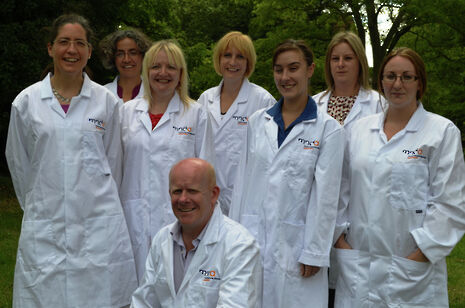Dr Belinda Cupid: On the front line against ALS
Elissa Foord talks to Dr Belinda Cupid, the Head of Research at the UK’s main ALS charity, about the benefits of the Ice Bucket Challenge

The social media nomination is a potent force. This year, we’ve Neknominated, gone make-up-free, and doused ourselves in icy water, all in its name. In the case of Neknominations especially, it killed. In the latter two cases, it is almost certainly saving lives.
‘‘Yes, I’ve done it,’’ says Dr Belinda Cupid. ‘‘I felt that a lot of people with MND [Motor Neurone Disease] can’t move, or don’t have the strength to hold a bucket over their heads, so it was in support of them.’’ But as Head of Research at the MND Association, the charity benefitting from the ALS Ice Bucket Challenge in the UK, this barely scratches the surface of Belinda’s contribution to combatting Motor Neurone Disease, of which ALS is the most common type.
MND is terrifying. As Belinda explains, ‘‘It damages the nerve cells that control movement, and leaves people without the ability to walk, talk or feed themselves.’’ And it never lets up. As the paralysis spreads, patients’ bodies become their prisons. ‘‘About 30 per cent of people who get a diagnosis die within a year,’’ she adds. The prognosis is generally between three and five years. 51 years after his diagnosis, Cambridge’s own Professor Stephen Hawking is a remarkable exception.
Devastating though it is, diagnoses are often missed. ‘‘Because there are so many ways in which MND first presents itself, GPs won’t always send somebody to a neurologist. Most GPs only see one patient with MND in their lifetime.’’ This speaks to a wider problem in combatting MND: it is not sufficiently common to provoke a great deal of awareness, but is common enough, and devastating enough, to be a worthy cause.
That’s why MND patient Pete Frates, who sparked the campaign, had to act. That’s the cause in whose name George Bush, Alistair Darling, Mark Zuckerberg, Benedict Cumberbatch, Lionel Messi, Roger Federer, Taylor Swift and Britney Spears have all risen to the Challenge. That’s why the Challenge’s millions of participants have raised almost £50 million.
But what difference will all this make? Understanding lies at the core of the matter, and at the moment it’s lacking. ‘‘We still don’t know what causes the vast majority of cases of MND; we think it’s a combination of lifestyle, environmental and genetic factors. And those genetic factors are very subtle.’’ Even in the case of the inherited form, ‘‘We know what the gene damage is in 60 per cent of cases, but we don’t understand its implications.’’
The money will be divided primarily between research projects and more campaigning. ‘‘It’s been a tremendous boost for the MND Association. We’ll be able to realise some of our research plans much sooner than we otherwise would have done. We’ll be able to analyse more samples for genetic analysis, and be able to fund more fellowships.’’
That’s where Cambridge comes in. The MND Association are funding the work of Dr Anne Bertolotti, who is researching the cause of the disease, and Dr Jemeen Sreedharan, who is working on evaluating the models (such as flies and mice) used in researching it.
Inevitably, the campaign has drawn voices of dissent. Much of this has been opinion for opinion’s sake. The most serious objectors have pointed out that narcissism, not altruism, is why many people on social media have responded to their nominations. In a number of cases, I don’t doubt it. Nor, if it helps the sufferers of this devastating condition, do I care. It has also been labelled a gimmick, yet its entertainment value, its simplicity, its accessibility to all, are without doubt central to its success. The drowning of Cameron Lancaster, though, suspected to have been a Challenge attempt gone dreadfully wrong, is a tragic reminder of the health warning that must be attached to nominations on social media.
‘‘I think it’s very difficult to replace the motor neurones that become damaged but what I’d really like to see is somebody to go to their neurologist and be told, ‘you’ve got MND. We can’t repair the damage that’s already been done, but take this pill and it won’t get any worse.’’’ So hope for a cure might be too much, but the MND Association’s research could reach a solution that, combined with improved diagnosis, comes in a close second.
And good progress is being made. Just this month, Harvard’s Professor Kevin Eggan published findings that suggest drugs already being trialled for other purposes may be able to extend the lifespan of MND patients. This is a cause to which money can really make a difference.
Movingly, Belinda mentions that MND patients are particularly engaged with, and interested in, the progress made in research into their illness. Put simply, ‘‘It’s their hope.’’
Watch Professor Stephen Hawking and Vice-Chancellor Leszek Borysiewicz take part in the Ice Bucket Challenger here
Text ICED55 to 70070 to donate £5 to the MND Association or visit www.mndassociation.org
 News / Cambridge academics sign open letter criticising research funding changes22 February 2026
News / Cambridge academics sign open letter criticising research funding changes22 February 2026 News / Student and union protesters hold ‘Trans Liberation Solidarity Rally’ 24 February 2026
News / Student and union protesters hold ‘Trans Liberation Solidarity Rally’ 24 February 2026 News / Union speakers condemn ‘hateful’ Katie Hopkins speech14 February 2026
News / Union speakers condemn ‘hateful’ Katie Hopkins speech14 February 2026 Features / Beyond the porters’ lodge: is life better outside college?24 February 2026
Features / Beyond the porters’ lodge: is life better outside college?24 February 2026 Fashion / The evolution of the academic gown24 February 2026
Fashion / The evolution of the academic gown24 February 2026







